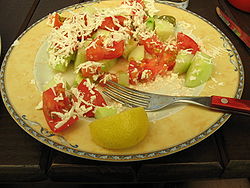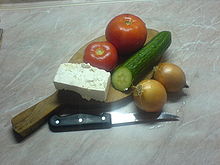
Shopska salad
Encyclopedia


Bulgarian language
Bulgarian is an Indo-European language, a member of the Slavic linguistic group.Bulgarian, along with the closely related Macedonian language, demonstrates several linguistic characteristics that set it apart from all other Slavic languages such as the elimination of case declension, the...
, Macedonian
Macedonian language
Macedonian is a South Slavic language spoken as a first language by approximately 2–3 million people principally in the region of Macedonia but also in the Macedonian diaspora...
, Serbian
Serbian language
Serbian is a form of Serbo-Croatian, a South Slavic language, spoken by Serbs in Serbia, Bosnia and Herzegovina, Montenegro, Croatia and neighbouring countries....
: Шопска салата; Croatian
Croatian language
Croatian is the collective name for the standard language and dialects spoken by Croats, principally in Croatia, Bosnia and Herzegovina, the Serbian province of Vojvodina and other neighbouring countries...
: Šopska salata; Romanian
Romanian language
Romanian Romanian Romanian (or Daco-Romanian; obsolete spellings Rumanian, Roumanian; self-designation: română, limba română ("the Romanian language") or românește (lit. "in Romanian") is a Romance language spoken by around 24 to 28 million people, primarily in Romania and Moldova...
: Salata bulgărească; Czech
Czech language
Czech is a West Slavic language with about 12 million native speakers; it is the majority language in the Czech Republic and spoken by Czechs worldwide. The language was known as Bohemian in English until the late 19th century...
: Šopský salát; Albanian
Albanian language
Albanian is an Indo-European language spoken by approximately 7.6 million people, primarily in Albania and Kosovo but also in other areas of the Balkans in which there is an Albanian population, including western Macedonia, southern Montenegro, southern Serbia and northwestern Greece...
: Salat Shope; Hungarian
Hungarian language
Hungarian is a Uralic language, part of the Ugric group. With some 14 million speakers, it is one of the most widely spoken non-Indo-European languages in Europe....
: Sopszka saláta) is a traditional Bulgaria
Bulgaria
Bulgaria , officially the Republic of Bulgaria , is a parliamentary democracy within a unitary constitutional republic in Southeast Europe. The country borders Romania to the north, Serbia and Macedonia to the west, Greece and Turkey to the south, as well as the Black Sea to the east...
n cold salad
Salad
Salad is any of a wide variety of dishes, including vegetable salads; salads of pasta, legumes, eggs, or grains; mixed salads incorporating meat, poultry, or seafood; and fruit salads. They may include a mixture of cold and hot, often including raw vegetables or fruits.Green salads include leaf...
popular throughout the Balkans and Central Europe.
It is made from tomato
Tomato
The word "tomato" may refer to the plant or the edible, typically red, fruit which it bears. Originating in South America, the tomato was spread around the world following the Spanish colonization of the Americas, and its many varieties are now widely grown, often in greenhouses in cooler...
es, cucumber
Cucumber
The cucumber is a widely cultivated plant in the gourd family Cucurbitaceae, which includes squash, and in the same genus as the muskmelon. The plant is a creeping vine which bears cylindrical edible fruit when ripe. There are three main varieties of cucumber: "slicing", "pickling", and...
s, onion
Onion
The onion , also known as the bulb onion, common onion and garden onion, is the most widely cultivated species of the genus Allium. The genus Allium also contains a number of other species variously referred to as onions and cultivated for food, such as the Japanese bunching onion The onion...
, raw or roasted pepper
Capsicum
Capsicum is a genus of flowering plants in the nightshade family, Solanaceae. Its species are native to the Americas where they have been cultivated for thousands of years, but they are now also cultivated worldwide, used as spices, vegetables, and medicines - and have become are a key element in...
s (preferably roasted), sirene
Sirene
Sirene/ Sirenje or known as "white brine sirene" .Salads: Shopska salad with tomatoes, bell peppers, cucumbers, onions and sirene. Ovcharska salad with the above mentioned vegetables, cheese, ham, boiled eggs and olives. Tomatoes with sirene is a traditional light salad during the summer.Eggs:...
(white brine cheese), and parsley.
Preparation

Sunflower oil
Sunflower oil is the non-volatile oil expressed from sunflower seeds. Sunflower oil is commonly used in food as a frying oil, and in cosmetic formulations as an emollient. Sunflower oil was first industrially produced in 1835 in the Russian Empire.- Composition :Sunflower oil is mainly a...
or olive oil
Olive oil
Olive oil is an oil obtained from the olive , a traditional tree crop of the Mediterranean Basin. It is commonly used in cooking, cosmetics, pharmaceuticals, and soaps and as a fuel for traditional oil lamps...
, which are occasionally complemented by vinegar
Vinegar
Vinegar is a liquid substance consisting mainly of acetic acid and water, the acetic acid being produced through the fermentation of ethanol by acetic acid bacteria. Commercial vinegar is produced either by fast or slow fermentation processes. Slow methods generally are used with traditional...
. The addition of vinegar only contributes, however, to the sour flavor that the tomatoes impart. In restaurants, the dressings are provided separately. Lastly, the vegetables are covered in a thick layer of grated or diced sirene. In areas where sirene cheese is unavailable, feta
Feta
Feta is a brined curd cheese traditionally made in Greece. Feta is an aged crumbly cheese, commonly produced in blocks, and has a slightly grainy texture. It is used as a table cheese, as well as in salads Feta is a brined curd cheese traditionally made in Greece. Feta is an aged crumbly cheese,...
cheese may be used as a substitute. This salad is often consumed as an appetizer with rakija.
Shopska salad derives its name from the regional group called Shopi
Shopi
Shopi is a regional term referring to people that speak a transitional dialect group of South Slavic, self-identifying as Bulgarians, Macedonians and Serbs. The areas traditionally inhabited by the Shopi is called Shopluk Shopi (scientific transliteration of Bulgarian, Macedonian, ; Serbian latin...
living mostly in parts of Bulgaria
Bulgaria
Bulgaria , officially the Republic of Bulgaria , is a parliamentary democracy within a unitary constitutional republic in Southeast Europe. The country borders Romania to the north, Serbia and Macedonia to the west, Greece and Turkey to the south, as well as the Black Sea to the east...
(but also in areas of Serbia
Serbia
Serbia , officially the Republic of Serbia , is a landlocked country located at the crossroads of Central and Southeast Europe, covering the southern part of the Carpathian basin and the central part of the Balkans...
and the Republic of Macedonia
Republic of Macedonia
Macedonia , officially the Republic of Macedonia , is a country located in the central Balkan peninsula in Southeast Europe. It is one of the successor states of the former Yugoslavia, from which it declared independence in 1991...
).
According to Bulgarian Radio, shopska salad was popularized (or perhaps invented) by Balkantourist
Balkantourist
Balkantourist is the oldest existing Bulgarian tour operator, established on 6 January 1948 as a state-owned government monopoly in what was then the People's Republic of Bulgaria...
, the Bulgarian state tourist organization, in 1960.
See also
- Greek saladGreek saladGreek salad is a summer salad in Greek cuisine.Greek salad is made with pieces of tomatoes, sliced cucumber, green bell peppers, red onion, sliced or cubed feta cheese, and Kalamata olives, typically seasoned with salt and dried oregano, and dressed with olive oil...
, a similar salad in Greek cuisine - Serbian saladSerbian saladSerbian salad is a vegetable salad, usually served during summer with roast meat and other dishes. It is made from diced fresh tomatoes, cucumbers, onions and grated feta, usually seasoned with olive oil, salt and commonly feferon - a local hot pepper similar to cayenne pepper....
- Çoban salatası, a similar salad in Turkish cuisine
- List of salads

